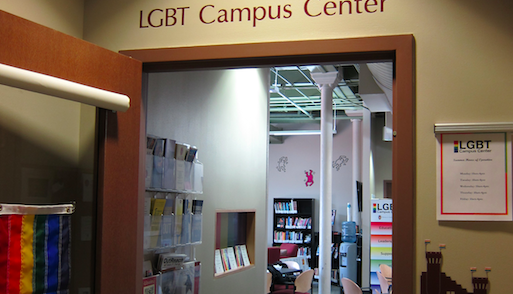The University of Wisconsin LGBT Campus Center held a discussion Wednesday night on whiteness in LGBTQ+ spaces and its impact on the community.
LGBT Campus Center graduate student staff member and event co-facilitator Cecil Leigh Wilson set the tone for the forum by defining whiteness.
“[Whiteness] is a force of oppression that has social and material effects,” Leigh Wilson said. “It’s bigger than any individual white person — it’s more than the sum of its parts — even though all white people participate in it and have a stake in it.”
All white people are born into white supremacy, Wilson said, though individuals raised in this atmosphere may now be in different places individually regarding their level of discussion about whiteness.
The first part of the discussion asked the attendees to consider the extent to which they have discussed whiteness with others. Many participants reflected on past dialogues where they found it difficult to precisely articulate their sentiments on this topic.
UW student Misha Johnson shared an idea she learned from a class lecture earlier today, where a guest speaker disseminated the concept of white supremacy.
“One thing [the guest lecturer] said that really struck me was that white supremacy is a myth, and that if white supremacy was true, I guess that white people wouldn’t need racism to keep — I don’t want to say ‘people of color’ — but keep people of color down,” Johnson said.
The conversation shifted to how whiteness manifests in LGBTQ+ spaces and if anyone had ever intervened in a situation where this was occurring.
Mexican-American UW research fellow Aaron Lopez explained his outlook on conversations he has been apart of about whiteness that occur with white people present.
“Whenever whiteness or race issues are brought up in a queer space or among friends who are white, there will always be this anger on behalf of people of color and minorities, which is fine, but the amount of frustration or anger that they feel compared to what I am feeling at the moment or how I express it seems to kind of put pressure on the conversation to make it less complex than it really is,” Lopez said.
Lopez also mentioned the added intricacy of not wanting to be stereotyped as the friend constantly bringing race into the conversation when disrupting whiteness.
In response to Lopez, Johnson observed how movements for marginalized groups usually do not have much traction until a “white hand” brings the problem to the surface.
Though much of the conversation was devoted to whiteness, Wilson noted the power everyone has to combat this institutionalized issue and engage in thoughtful, constructive discussions.
“The conversation we have today, and any future conversations we have about whiteness might be uncomfortable and difficult…that’s also okay,” Wilson said. “All people have the capacity to erode [whiteness’] effects, to disrupt it, to make changes when you see what’s happening.”


